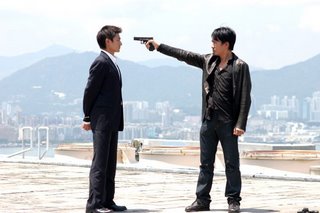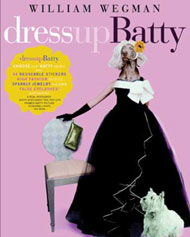
 UPDATE(2.26.07): comparative analysis done! find it here. -stephan!e
UPDATE(2.26.07): comparative analysis done! find it here. -stephan!eHey there, Martin Scorsese! I LOVED your new film, but I gotta say -- and I say this not out of spite or bitterness or frustration, but because I love you and want you to get an Oscar for your fine work: you might have pissed a lot of fine people off.
And I don't just mean the Chinese...
Hello, readers!
I hope you're having a good weekend. I am, because I saw THE DEPARTED and though I loved it, I soon found out it was a remake/ inspired by (depending on who you ask) a Hong Kong film trilogy, INFERNAL AFFAIRS (2002).
I am considering a research project now in which I will watch both TD and IA and compare them (especially since the bad guys in THE DEPARTED were, surprise surprise, Chinese! I thought this ironic, especially after I learned it was preceded by a strikingly similar Chinese film!) I thought it would also be interesting to compare INFERNAL AFFAIRS to other Chinese action films, to hopefully discover some nuances in genre that might explain the overwhelming popularity of this film in particular.
Let me know what you think.
-Stephanie
P.S. Don't get me wrong, I think Scorsese deserves an Oscar. And I think THE DEPARTED was BRILLIANT. I want it to get an Oscar... but then again, it seems too far off from an original work to deserve one. Which is unfortunate, because the acting, cinematography, use of music, and direction were so intelligent and phenomenally done, it is a huge disappointment to see that this film might get some critical flak for seeming too much like theft of intellectual property.
P.P.S. And don't get me wrong, if this film doesn't get critically acclaimed or recognized, it would be for this very reason alone (and, I think, a well-deserved critique at that). Yes, THE DEPARTED was brilliant. BUT, so was INFERNAL AFFAIRS. And, as the predecessor/ the inspiration/ the original/ what-have-you, deserves some more credit than what Scorsese is willing to give (Says director Scorsese: "'Infernal Affairs' is a very good example of why I love the Hong Kong Cinema, but 'The Departed' is not a remake of that film. Our film was inspired by 'Infernal Affairs,' because of the nature of the story. However, the world Monahan created is very different from the Hong Kong film. -source) That's all I want, just an admission of attribution.
p.p.s. also read:
Hong Kong Handover
By Brian Hu
Not surprisingly, Martin Scorsese's awaited remake of Hong Kong's beloved Infernal Affairs is a high-octane blast of pure cinema. The surprise is that the guns are pointed at China.
In Martin Scorsese's The Departed, Frank Costello, the maniacal mob boss played by Jack Nicholson, is about to deal sensitive weapons to some shady mainland Chinese agents who bring uncommonly large guns to the secret meeting. "Bringing automatic weapons doesn't add inches to your dick size!" he responds. With his trademark smirk, Nicholson starts to spew that machine-gunfire barrage of lunatic insults we've come to expect from him. In his best Chinaman accent, he snickers, "No tickee, no laundry," an insult I must confess to not understanding. Meanwhile, the Chinese agents silently take the verbal abuse, conceding their defeat.
The crowd -- comprised by a good number of film critics -- roared in laughter. Looking around online, it seems that this has been the general consensus among mainstream American viewers. That crazy Jack Nicholson! Those silly Asians!
On the other hand, I found it a bit harder to laugh. Yes, the scene was indeed funny even though I recognized that at the heart of the humor was not Nicholson's charisma, but decades-old stereotypes about sinister Chinese people or mysterious Chinatown (visually rendered with the same attention to grime and sleaze -- complete with porn theater -- as in Taxi Driver). But the bad accents and the laundry references weren't what bothered me; like many Chinese Americans, I've learned to expect this sort of juvenile racism from Hollywood.
No, what angers me to no end is that this film is a remake of the Hong Kong thriller Infernal Affairs, one of the most beloved Chinese-language films of the past ten years and a source of pride for Chinese-speaking audiences who lament the death of their own national cinemas to Hollywood domination. Like many fans of the film, I had mixed feelings about the proposed Hollywood remake, although I was willing to hold out hope since a revered director like Martin Scorsese was announced to direct it.
As I've argued before, there's nothing inherently wrong with Hollywood remakes of Asian films; as with the case of The Grudge, the cross-cultural contact opens new thematic possibilities. In fact, I was looking forward to seeing how the very-Hong Kong theme of good gangster, bad cop is transported to Boston. The evil of the Hollywood remake isn't in the plagiarism, it's in the strategic erasure of its Asian antecedent. We're not supposed to know that The Lake House is based on Il Mare or that The Departed is based on Infernal Affairs. This differs from, for example, the Bollywood remake of Fight Club, which is billed as 'our' version of Fight Club to be held up next to the original, and not a direct replacement of it.
The makers of The Departed have worked hard to disassociate themselves from the original. Jack Nicholson has publicly stated his refusal to watch the original because he wanted to be true to his own instincts. In the press kit, the screenwriter William Monathan similarly defends his decision not to watch the original (even though he worked from an English translation of the original script). In the same notes, Scorsese maintains that The Departed is "not a remake."
But as most fans of Infernal Affairs have observed, The Departed is indeed very similar to the original. It's not a re-imagining of the story as much as a direct translation, with certain items added to appeal to American sensibilities (sexuality, psychological motivation, sarcastic dialogue, etc.). By denying the influence of Infernal Affairs, The Departed denies its non-American roots and cultural hybridity, while it offends the fans (Asian and non-Asian) of the original.
Given this disrespect, the negative stereotypes of Chinese characters only compound the offense. Don't the filmmakers realize that when you steal somebody else's culture, they'll be carefully watching what you do with it? Don't they realize that there are audiences of The Departed who will be watching very carefully, sensitive to every deviation from their beloved original? Do these minority subjectivities even matter to Hollywood?
Sure, the scenes involving the mainland Chinese comprise only a small portion of the film, and sure the characters in the film also insult women, gays, blacks, Italians, and countless other groups. But this remake is supposed to be a tribute to Hong Kong cinema. Perhaps Scorsese's denial that this is in fact a remake exonerates him from having to pay respect to the originating culture. Hollywood doesn't need to be politically correct; it needs to be culturally honest.
I'm shocked that this issue hasn't been more prevalent in critical discourse. Fans are debating it in various blogs and message boards, but critics are absolutely silent. J. Hoberman of the Village Voice and Manohla Dargis of the New York Times correctly note that Hong Kong cinema has long been indebted to Martin Scorsese, but this only justifies Hollywood's attempt to erase its own indebtedness to Hong Kong.
Thinking that Chinese fans would express their dissatisfaction with the portrayal of Chinese people, I turned to the Chinese language media. The Taiwanese press has indeed expressed some concerns, although for a different reason: as part of his verbal humiliation of Chinese people, Nicholson's character taunts the mainlanders to "nuke Taiwan." Meanwhile, Hong Kong audiences are laughing at the poor Cantonese accents, as well why mainland agents are speaking Cantonese to begin with. Mainland China, not surprisingly, is not allowing the film to be shown in theaters.
Very few of these negative reactions are from people who disliked the film. I too, found The Departed an exhilarating film, and I'll be the first to admit that while I found Infernal Affairs a more emotional experience (with a better ending), Martin Scorsese is a hell of a better all-round filmmaker than the directing team of Andrew Lau and Alan Mak. I'll also be the first to acknowledge that Infernal Affairs too wasn't without objectionable representations; the Chinese trafficking scene in The Departed corresponds to the original's Thai drug deal scene, which itself is based on stereotypes of Thai criminals. But then again, Infernal Affairs wasn't a remake of a Thai film. So, what I object to about The Departed isn't the filmmaking or even the Asian pot-shots, but the haughty attitude the film and its makers project in the name of Oscar-worthy "art." Thanks, Hollywood, you've uncovered a new way to simultaneously congratulate yourself while offending the basis of your success.










